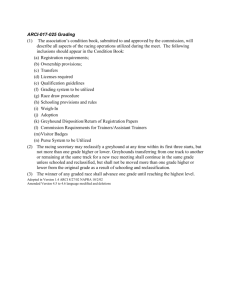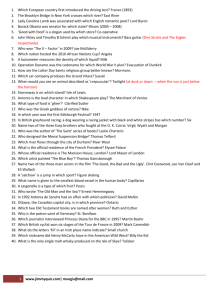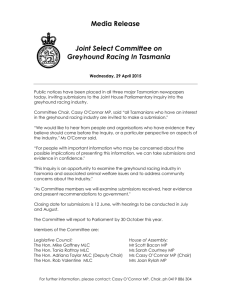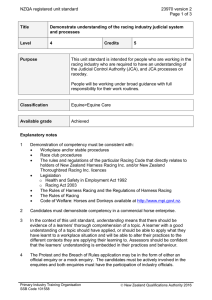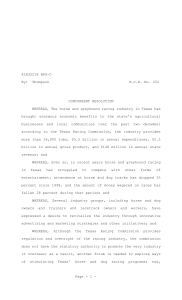Demonstrate knowledge of the greyhound racing judicial system
advertisement
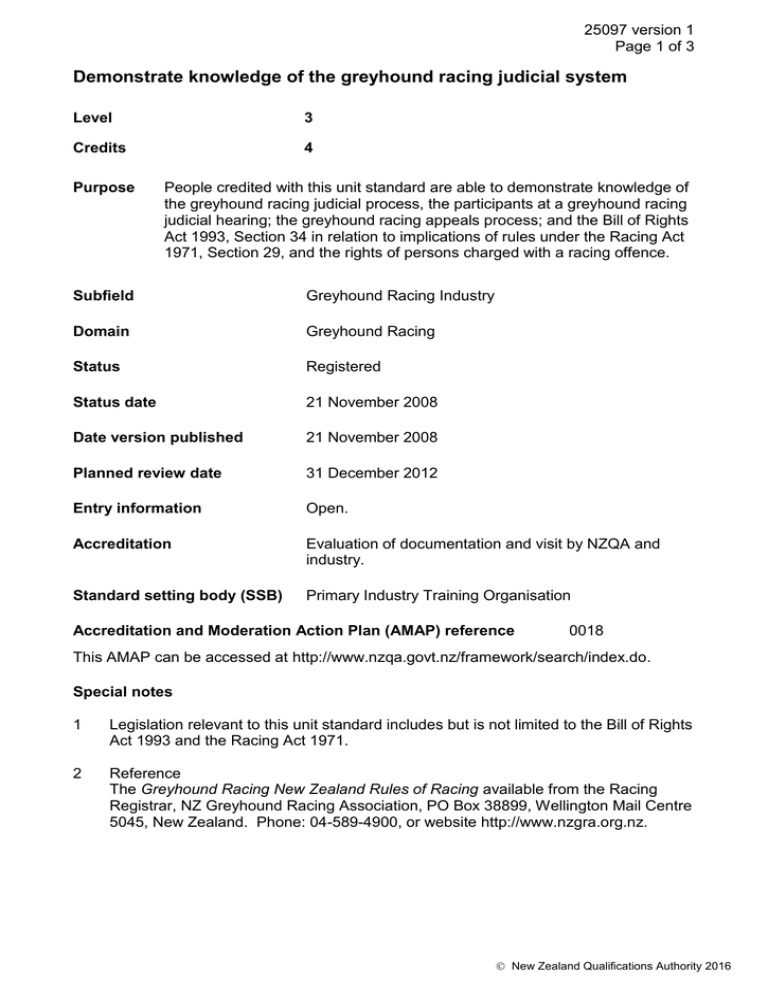
25097 version 1 Page 1 of 3 Demonstrate knowledge of the greyhound racing judicial system Level 3 Credits 4 Purpose People credited with this unit standard are able to demonstrate knowledge of the greyhound racing judicial process, the participants at a greyhound racing judicial hearing; the greyhound racing appeals process; and the Bill of Rights Act 1993, Section 34 in relation to implications of rules under the Racing Act 1971, Section 29, and the rights of persons charged with a racing offence. Subfield Greyhound Racing Industry Domain Greyhound Racing Status Registered Status date 21 November 2008 Date version published 21 November 2008 Planned review date 31 December 2012 Entry information Open. Accreditation Evaluation of documentation and visit by NZQA and industry. Standard setting body (SSB) Primary Industry Training Organisation Accreditation and Moderation Action Plan (AMAP) reference 0018 This AMAP can be accessed at http://www.nzqa.govt.nz/framework/search/index.do. Special notes 1 Legislation relevant to this unit standard includes but is not limited to the Bill of Rights Act 1993 and the Racing Act 1971. 2 Reference The Greyhound Racing New Zealand Rules of Racing available from the Racing Registrar, NZ Greyhound Racing Association, PO Box 38899, Wellington Mail Centre 5045, New Zealand. Phone: 04-589-4900, or website http://www.nzgra.org.nz. New Zealand Qualifications Authority 2016 25097 version 1 Page 2 of 3 Elements and performance criteria Element 1 Demonstrate knowledge of the greyhound racing judicial process. Performance criteria 1.1 The greyhound racing judicial process is described in terms of the importance of the Steward’s role. 1.2 The greyhound racing judicial process is described in terms of its function. 1.3 The greyhound racing judicial process is described in terms of the procedures for providing evidence, and the examination of evidence by all parties concerned. Range 1.4 video playback, registration papers, oral, accuracy. The greyhound racing judicial process is described in terms of the reasons for providing opportunity for submissions from all parties. Element 2 Demonstrate knowledge of the participants at a greyhound racing judicial hearing. Range stewards, trainer, connections, interested parties, other witnesses. Performance criteria 2.1 The participants at a greyhound racing judicial hearing are described in terms of their role. Element 3 Demonstrate knowledge of the greyhound racing appeals process. Performance criteria 3.1 The greyhound racing appeals process is described in terms of the situations where a trainer may lodge an appeal to review a judicial decision. 3.2 The greyhound racing appeals process is described in terms of the procedures for lodging an appeal to a judicial decision. New Zealand Qualifications Authority 2016 25097 version 1 Page 3 of 3 Element 4 Demonstrate knowledge of the Bill of Rights Act 1993, Section 34 in relation to implications of rules under the Racing Act 1971, Section 29, and the rights of persons charged with a racing offence. Performance criteria 4.1 The Bill of Rights Act 1993, Section 34, is described in terms of its implications for rules under the Racing Act 1971, Section 29. 4.2 The Bill of Rights Act 1993, Section 34, is described in terms of the rights of persons charged with a racing offence. Range evidence is required for at least four rights. Please note Providers must be accredited by NZQA, or an inter-institutional body with delegated authority for quality assurance, before they can report credits from assessment against unit standards or deliver courses of study leading to that assessment. Industry Training Organisations must be accredited by NZQA before they can register credits from assessment against unit standards. Accredited providers and Industry Training Organisations assessing against unit standards must engage with the moderation system that applies to those standards. Accreditation requirements and an outline of the moderation system that applies to this standard are outlined in the Accreditation and Moderation Action Plan (AMAP). The AMAP also includes useful information about special requirements for organisations wishing to develop education and training programmes, such as minimum qualifications for tutors and assessors, and special resource requirements. Comments on this unit standard Please contact the Primary Industry Training Organisation standards@primaryito.ac.nz if you wish to suggest changes to the content of this unit standard. New Zealand Qualifications Authority 2016
